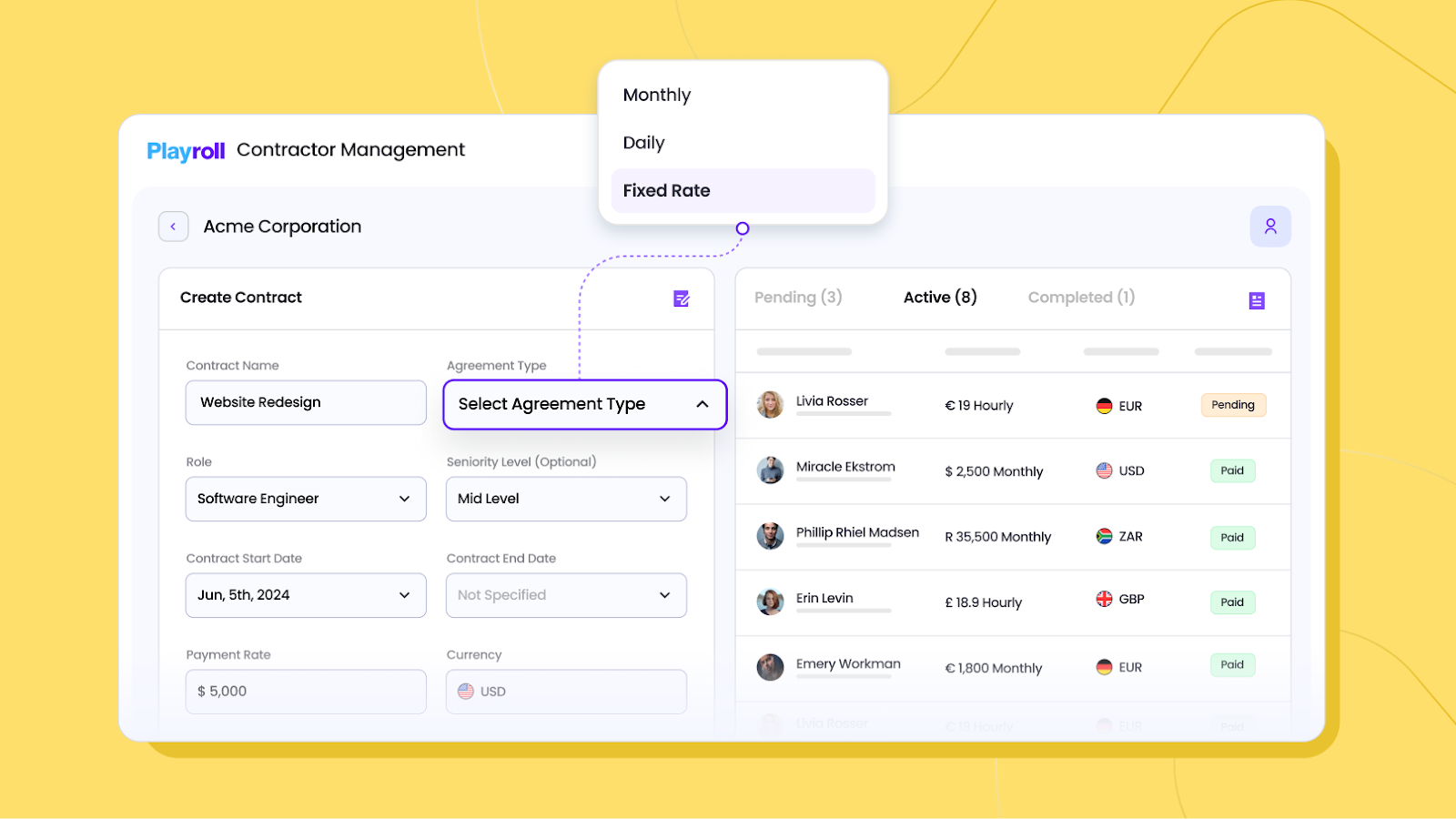Copied to Clipboard
Ready to get Started?


Key Takeaways
W2 employees are full-time with benefits and tax withholding, while 1099 contractors are self-employed with more flexibility and responsibility for their own taxes.
Misclassifying workers can lead to penalties. Employers must follow IRS guidelines to avoid costly mistakes.
W2 employees are best for long-term stability, while 1099 contractors suit short-term or specialized roles. Choose which is best for you based on your business needs.
Ready to kick off the hiring process for a new team member? An important decision you’ll face early on in the hiring process is whether they should be hired as a W2 employee or a 1099 contractor. Get this wrong, and you could end up with back taxes, fines, and major legal problems. Companies have faced penalties ranging from hundreds of thousands to millions of dollars for these errors.
Just look at Uber’s costly mistake in 2016, when the company lost $100 million in settlements after 400,000 drivers in California and Massachusetts sued for being misclassified as independent contractors instead of employees. This case underscores the serious risks involved in worker classification. To avoid falling into the same trap, it's important to understand the differences between W2 employees and 1099 contractors.
In this article, we’ll break down these distinctions to help you make smarter, safer decisions for your business. With Playroll’s expertise, you can navigate the complexities of worker classification like a pro, protecting both your bottom line and your reputation.
What's the Difference Between W2 and 1099 Employees?
From a business strategy standpoint, understanding the differences between W2 employees and 1099 contractors goes beyond just annoying stacks of paperwork. It affects your bottom line, tax strategy, and the culture of your company.
Let's break it down:
What is a W2 Employee?
A W2 employee is someone who is hired directly by your company full-time, receives a regular salary, and has taxes withheld by you, the employer. They work under your direction and are integrated into the core operations of your business. Your company is responsible for handling their tax withholdings, providing benefits, and controlling how and when the work gets done.
This type of worker is typically suited for long-term roles that require continuity and dependability. Think about your in-house team, whether in administration, customer service, or operations.
What is a 1099 Independent Contractor?
On the flip side, a 1099 contractor is not part of your core workforce. They’re specialists who have their own business and can choose how, when, and where to do their work. They’re responsible for their own taxes, including the self-employment taxes such as Social Security tax and Medicare tax, and will send quarterly payments to the IRS.
Freelancers, consultants, or gig economy workers are classic examples of 1099 contractors. These workers offer specialized skills for specific tasks and projects. They’re a valuable addition to a team, but temporary and flexible.
Here’s a comparison table to summarise the key differences:
Comparing 1099 Workers vs W2 Employees
Getting your classification right isn’t just important when it comes to avoiding penalties, but also when it comes to optimizing how you manage your workforce. Whether you’re hiring for specific projects or building a long-term team, the structure of your workforce impacts taxes, benefits, and even the flexibility of your business operations.
Tax Differences
If you’re hiring a W2 employee, you’re responsible for withholding federal and state income taxes, as well as FICA (Social Security and Medicare). You also take on the responsibility for providing your employee with benefits like healthcare and retirement plans, and you’ll file a W-2 form to report their annual income.
For 1099 contractors, the situation is different. They are responsible for their own taxes, including self-employment tax, which is a combined 15.3% rate for Social Security and Medicare. No taxes are withheld from their pay, and you’ll issue a 1099-NEC form at the end of the year if you pay them $600 or more annually.
Benefits and Protections
W2 employees typically enjoy the benefits of employment such as health insurance, retirement plans, paid time off (PTO), and are protected by labor laws that ensure fair treatment, like minimum wage and overtime pay.
1099 contractors, however, aren’t legally entitled to receive benefits, but they do have the ability to write off business expenses like equipment, office supplies, and travel costs. From a business strategy perspective, this flexibility can be a great advantage for short-term projects, though you’ll need to weigh the tradeoff in terms of worker commitment and stability.
Intellectual property (IP) is another area where control differs. For W2 employees, the work they create is usually owned by you and your company, but for 1099 contractors, you need to be extra careful. Unless your contract specifically states that you own the rights to the work, the contractor may retain those rights. We recommend getting this in writing to avoid any future disputes or uncomfortable conversations.
Control and Flexibility
While W2 employees work under your direction and follow set schedules, 1099 contractors operate with far more freedom. They dictate when and how they work, often using their own tools and resources. But here’s where it’s easy to make a mistake: If you start controlling too much of how a contractor works, you risk misclassifying them as a W2 employee.
If you start setting their schedules for example, providing extensive training, or directing their daily activities, you may unintentionally turn them into W2 employees under IRS guidelines. This is a risk area where businesses are often hit with penalties.
Financial Considerations
W2 employees receive a steady paycheck with taxes withheld, offering predictability but increasing your overhead due to benefits and employer FICA taxes (about 7.65% of wages paid).
1099 contractors often charge higher rates to cover their own taxes and benefits, and you must issue 1099-NEC forms for payments over $600. While contractors provide cost flexibility, their income can fluctuate monthly, and you’ll need to pay careful attention to avoid a misclassification hiccup.
How Does the IRS Classify 1099 and W2 Workers
The IRS classifies workers based on three key factors: behavioral control, financial control, and the type of relationship. They don’t care about what the contract says; they care about the actual working relationship. This "economic realities" test is used to determine whether a worker is an employee or an independent contractor.
- Control: How much direction you give the worker in terms of their tasks.
- Financial Risk: Does the worker put in their own money for equipment or other costs?
- Relationship Type: Is the worker with you long-term, or just for a specific project?
Many states, like California, have their own stricter tests (such as the ABC test), which make it even more important to stay on top of worker classification. If you’re unsure about a worker’s classification, you can use IRS Form SS-8 to get clarity.
Pros and Cons for Hiring Each Kind of Worker
Choosing between W-2 employees and 1099 contractors depends on your business goals, company culture, and your current business model. Are you a startup or SMB with limited funding looking to keep costs low but need specialized skills for a short-term project? Or are you an established business looking to build a long-term team?
Here’s a look at the advantages and disadvantages of each option:
W-2 Employees
Pros:
- Long-term Stability: W-2 employees offer a sense of stability, which is invaluable when you need dependable workers for ongoing roles that require consistent attention.
- Strategic Projects: Full-time employees can work on a wider variety of tasks for your company, meaning they’ll be able to achieve key objectives for your company more successfully than a contract worker.
- Employee Benefits: Health insurance, retirement plans, paid time off – the list goes on. Offering these perks helps you attract and retain top talent, especially in competitive industries.
Cons:
- Less Flexibility: Both you and the employee are locked into set schedules and locations, which might limit your ability to pivot quickly or work outside of normal hours.
- Higher Costs: Employee benefits, FICA taxes, and other expenses add up quickly, making W-2 employees a more expensive option than contractors.
- More Administrative Work: Payroll, compliance, and managing benefits all require time and resources to maintain, adding to the complexity of your operations.
1099 Contractors
Pros:
- Flexibility & Control: Contractors offer the flexibility to hire for specific projects or periods without being tied down by long-term commitments. You get to choose when and how they work.
- Cost Efficiency: Contractors typically charge higher rates to offset the lack of benefits. While this may seem like an expense, it can save you money in the long run since you don’t have to cover their health insurance, retirement, or other perks.
- Tax Deductions: Contractors can write off business-related expenses, such as equipment and travel, which can make their overall compensation feel like a better deal for both parties.
Cons:
- Minimal Integration: A contract employee won’t fit into your team as cohesively as a full-time employee will, nor will they have the benefit of the context that comes with working in-house.
- No Benefits: Contractors don’t receive the typical benefits of full-time employees, like health insurance or paid leave. This might make it harder to attract and keep top talent for more long-term needs.
- Income Instability: Contractors are often working project-to-project, so they face more income instability, which could affect the quality or consistency of work you receive.
- Tax Complexity: Contractors handle their own taxes, including self-employment taxes, which can lead to confusion or complications if not managed correctly.

How to Decide What’s Best For Your Business
Ultimately, your decision comes down to the type of work you need done and your business’s strategy. Keep in mind that neither decision is set in stone, you can always convert a full-time employee to a contractor if that suits both parties, or vice versa a contractor into a full-time employee.
- W-2 Employees: If you’re building a team for consistent, long-term roles – like administrative support or a core team member – W-2 employees are a great choice. They offer stability, loyalty, and long-term commitment.
- 1099 Contractors: For short-term, specialized roles or project-based work – like hiring a freelance graphic designer, software developer, or consultant – 1099 contractors are ideal. They give you the flexibility to scale quickly without being tied to long-term commitments.
At the end of the day, choosing between W-2 employees and 1099 contractors comes down to the unique needs of your business. Both types of workers offer distinct advantages depending on your company size, goals, and the type of work you need done.
Keep reviewing your workforce strategy regularly, and don’t hesitate to seek expert advice if you're unsure. Reach out to our experts at Playroll and we’ll help you tailor your approach to maximize efficiency, manage costs, and get your business running better than it ever has before.
Book a free demo with our team today, and let’s ensure your workforce strategy is set for success.
1099 VS W-2 FAQs
What’s the main difference between a W-2 and a 1099 worker?

.png)
A W-2 employee works under your direction, with taxes withheld by you, and typically receives benefits like healthcare and retirement plans. A 1099 contractor is their own boss, controls their work, and handles their own taxes. Contractors are usually hired for specific, short-term projects.
What are the benefits of 1099 vs W-2?

.png)
1099 contractors offer flexibility, cost savings (no benefits or taxes on your end), and are ideal for short-term or specialized tasks. W-2 employees provide stability, long-term commitment, and more control over work while offering benefits that help attract top talent.
What happens if an employer misclassifies a worker as 1099 instead of W-2?

.png)
Misclassifying workers can lead to back taxes, penalties, and legal issues. If the IRS or labor agencies find the misclassification, you could face fines and even lawsuits. It’s crucial to classify workers correctly to avoid these risks.
How do taxes work differently for W-2 employees vs 1099 contractors?

.png)
For W-2 employees, you withhold taxes (federal, state, and FICA) from their paycheck and file a W-2 form. For 1099 contractors, they handle their own taxes and make quarterly payments. You provide them with a 1099-NEC form if they earn $600 or more, but no taxes are withheld by you.
.svg)
.svg)
.svg)

.svg)
.svg)




.png)

.png)


.svg)















.svg)